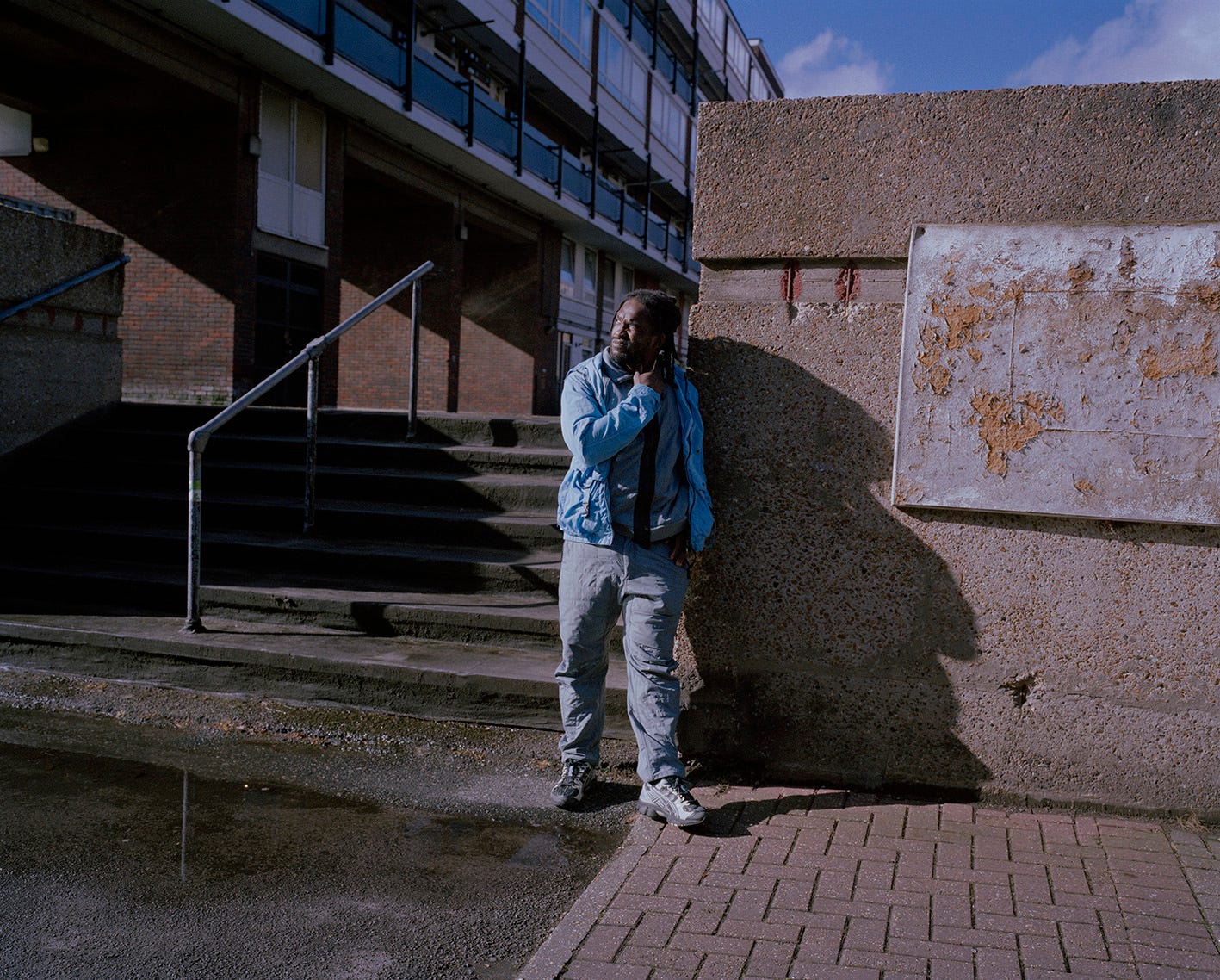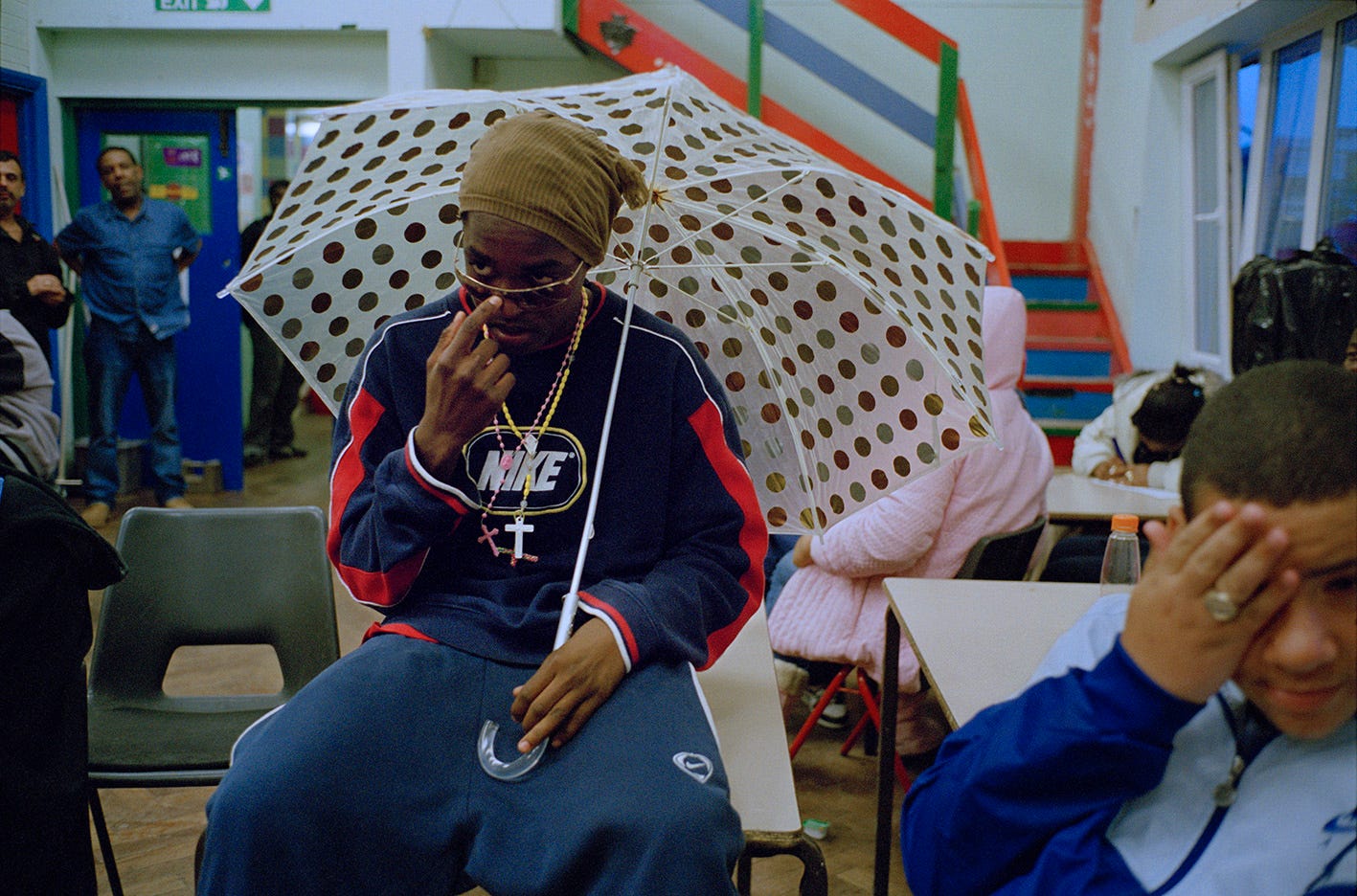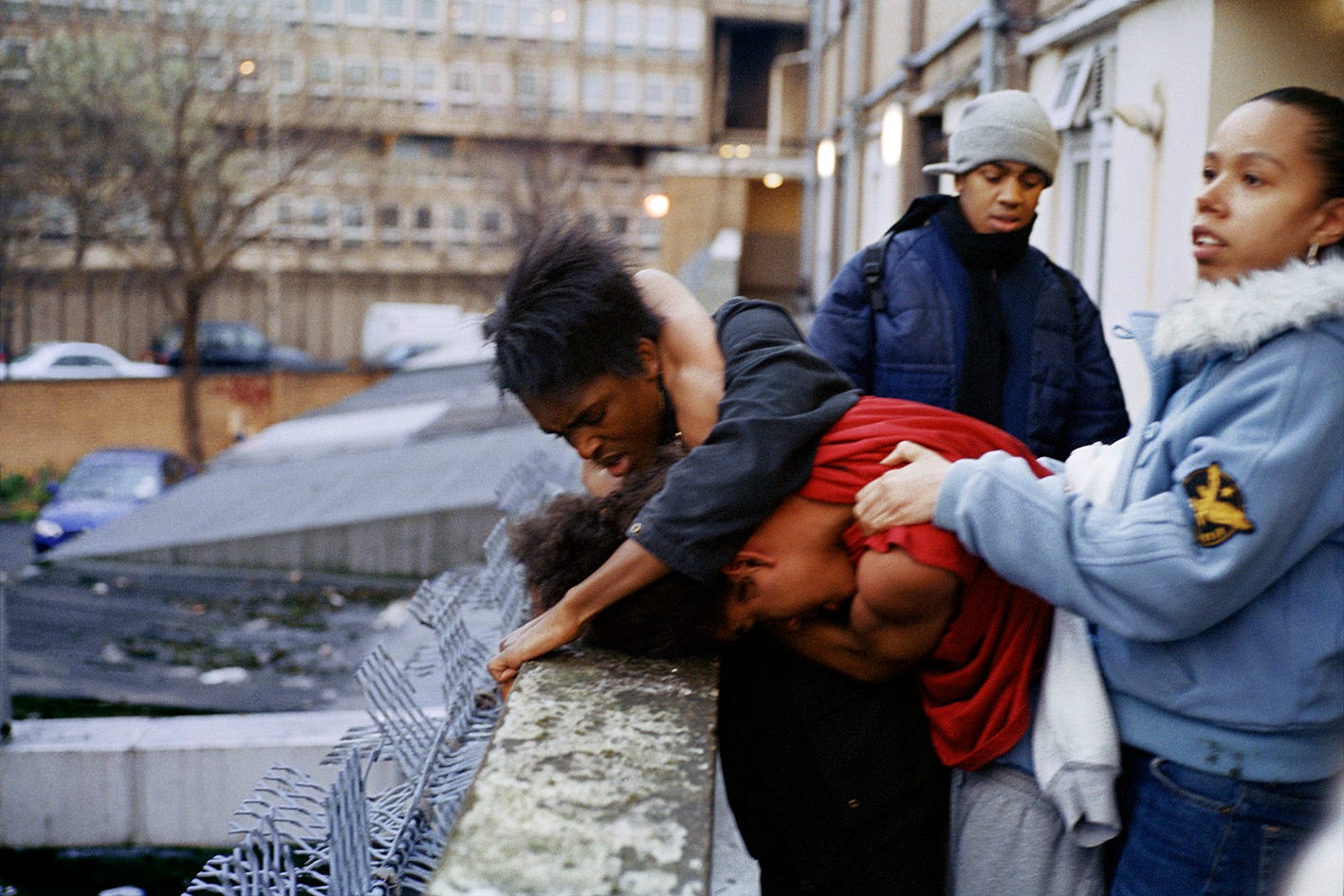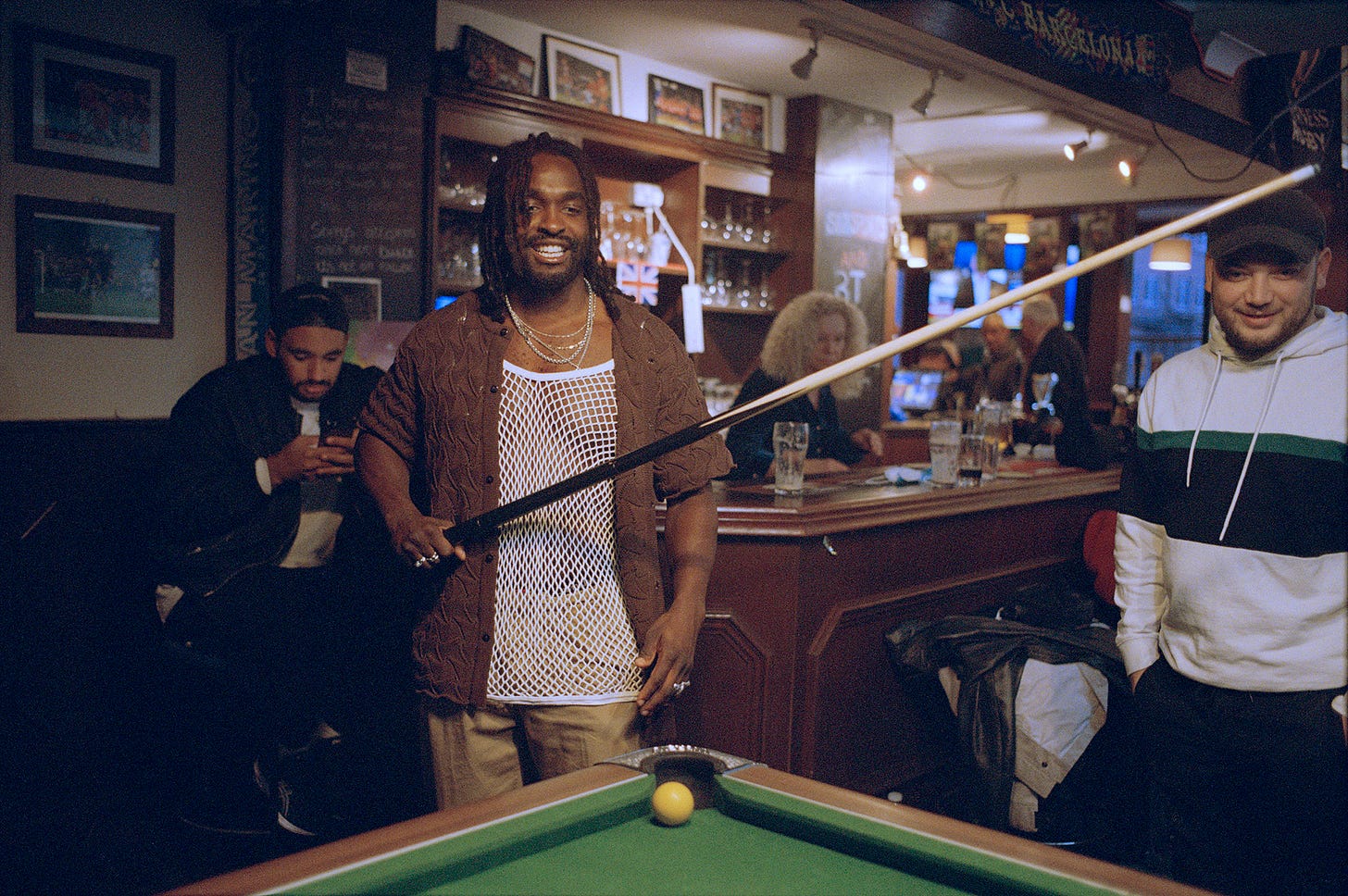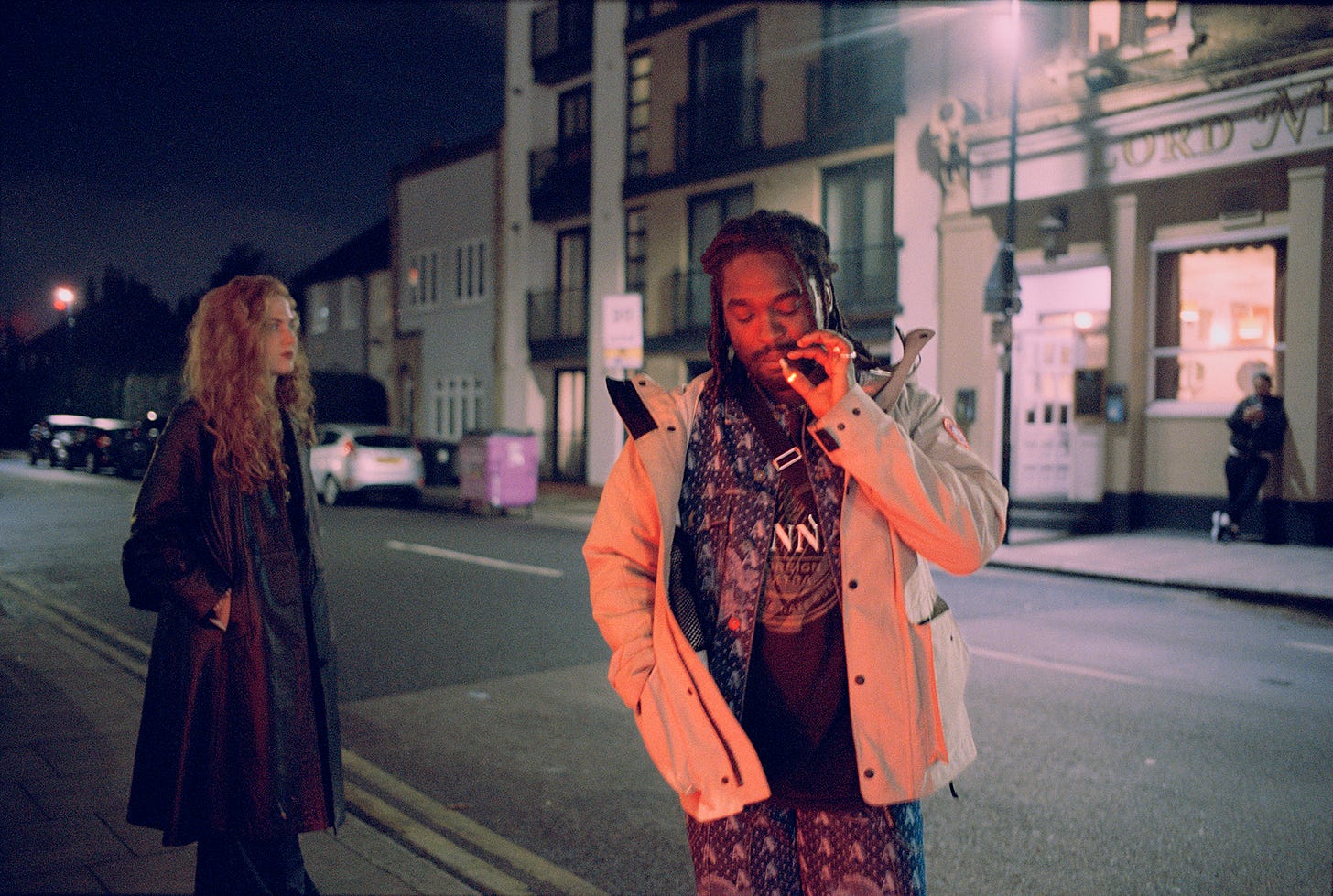Hak Baker on his album, World's End FM: "I don’t like conforming. I like fighting for something"
I spent St Patrick’s Day with the singer-songwriter in a pub on the Isle of Dogs to talk about his new album, World's End FM. Photography by Simon Wheatley
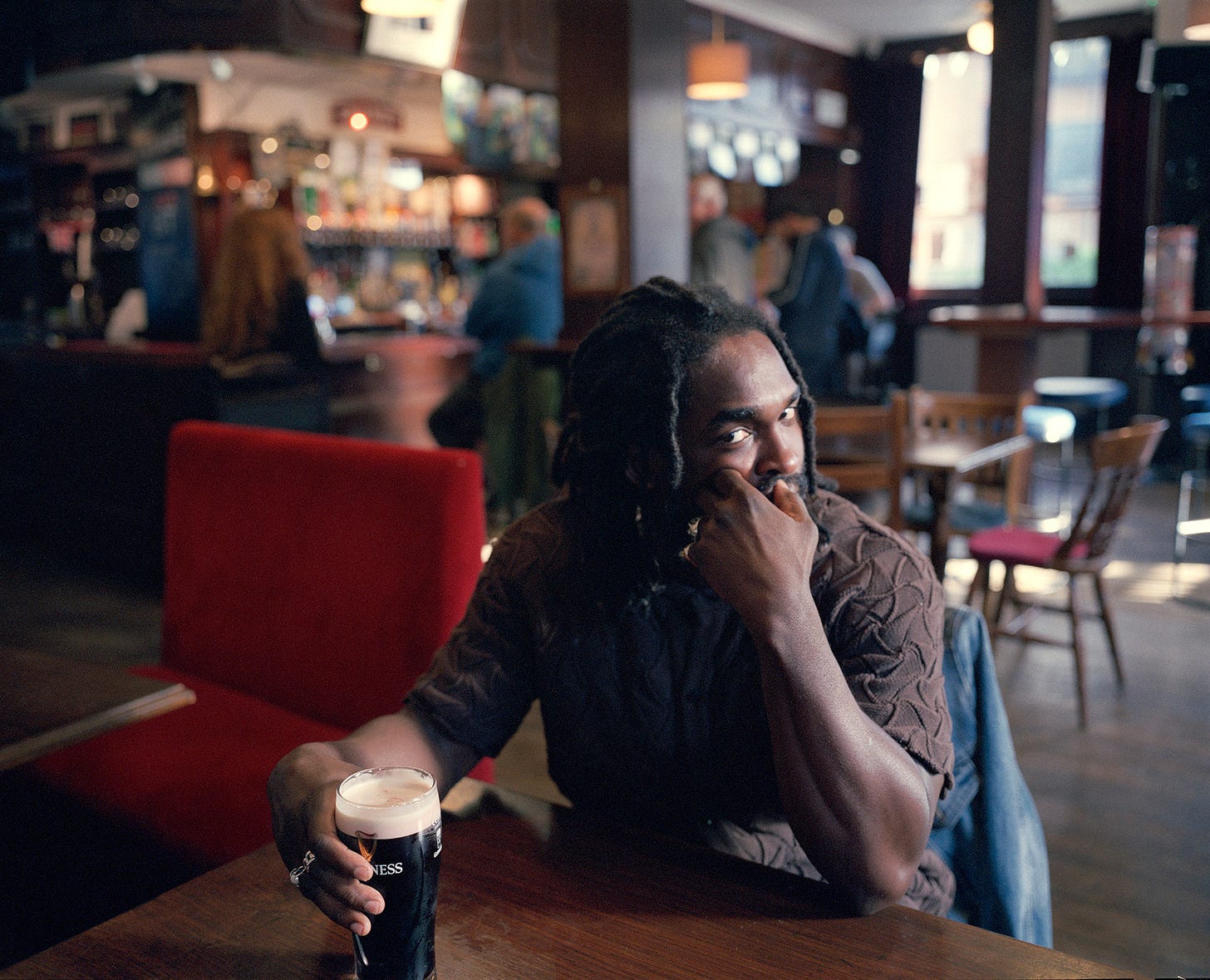
On a recent Friday evening, I was stood outside Rough Trade East vinyl shop on Brick Lane, east London, having eaten a salt beef bagel and Bakewell tart from a local bakery. Like everyone else posted on the curb, I was enjoying the evening sun whilst waiting for Hak Baker to arrive and perform. He was running late.
To be fair, it was a busy night for the 32-year-old singer-songwriter, following the release of his album, World’s End FM — which has since reached number 11 in the Official Independent Albums Chart. Rumours spread that he was stuck on a motorbike in central London traffic, after performing at Trevor Nelson’s Windrush 75 concert at the Royal Albert Hall. My mind couldn’t help but conjure images of him weaving between black cabs, his dreadlocks swaying beneath a helmet, a trusty guitar slung around his shoulders, loving every minute of the madness.
When he arrived, his legion of fans cheered. Wearing a wide grin, he marched into the venue and climbed on-stage. Within minutes, he was playing his triumphant single, “Bricks In The Wall”. Although this show was more stripped-down than his Glastonbury performance this week, or those of his forthcoming tour, I got the feeling that I was bearing witness to a star in the prime of his long-awaited ascent.
I first became familiar with Hak Baker through the photography of Simon Wheatley. As a teenager growing up on the Isle of Dogs, east London, in the 2000s, Hak navigated adolescence amongst the shadows of Canary Wharf’s looming towers. He was a younger of the pioneering grime crew, Roll Deep, and a member of Bomb Squad, as the new genre matured out of its rawest golden years.
Simon documented this context in his first book, Don’t Call Be Urban! The Time of Grime. Then, years later, when he returned to his archive to publish his second book, Lost Dreams, focusing on the now-extinct ecosystem of youth clubs and pirate radio stations that kept young people living on the margins of east London busy during the New Labour years, he found a natural main character in Hak. They reconnected.
Given their closeness, Hak’s album release, and my own dialogue with Simon, which I wrote about earlier this year, we decided to meet up as a three.
On St Patrick’s Day afternoon, I travelled across London with World’s End FM on loop in my headphones, as the pair made photographs on the Samuda Estate, E14, after visiting Pellicci’s café in Bethnal Green. We drove to the Lord Nelson pub, Hak’s local boozer, a stone’s throw from the Thames and George Green’s secondary school, which Hak attended in his youth, and, by coincidence, where I once worked as an education mentor. I remember teachers telling me about the ‘Isle mentality’ of students: living geographically close to everything, yet remaining socially cut-off.
Throughout World’s End FM, Hak fuses sharp city storytelling, anti-establishment tirades and an emotional love for life with the strums of his acoustic guitar to continue carving out a sub-genre of music he calls “G-folk”. The name and corresponding message of the album is more thought experiment than premonition, encouraging listeners to make the most of our limited time on this planet, appreciate our loved ones, and come together to celebrate in protest against stresses of the modern world.
Entering the Lord Nelson, Simon got to work trying to secure a portrait of Hak whilst he greeted fellow drinkers. Between pints of Guinness topped with blackcurrant cordial, Hak insisted on pouring out glasses of Turkish Pinar Spring water from a crate in the boot of his car. “Alkaline water, not Babylon water.”
One of Hak’s friends commented on my new hiking boots — “thought you’d take a hike to the Isle today, did ya!?” — before telling me about his caravan in the Lake District, where he goes to find peace when he needs to escape the city. An older punter warned us about taking the corner seat, because “soon a grumpy geezer with a dog’s gonna want his chair back.” I expected a towering frame walking in with a Pitbull, but the man who arrived held a small West Highland Terrier in a pink coat.
Amidst the din, I waited for the right moment to hit record on my dictaphone.
Ciaran Thapar: So where have we just come from?
Hak Baker: Samuda, walking about with Simon.
CT: Why there?
HB: Samuda’s where it all started. It was a place where different factions on the Isle of Dogs started gathering, where we started to congregate with people in a semi-villainous manner. Well, it wasn’t villainous, but it was deemed as that by the council and policing authorities. Villainous was the perception. But we were just protective of the place. Everyone should protect their home turf. We utilised the turf. We monopolised the turf, just like other people monopolise their turf. We weren’t hurting nobody.
CT: Before I arrived, you went to Pellicci’s earlier today, too.
HB: Yeah, but Pelicci’s was too ram outside and there were too many middle class cunts lining up in the rain, and that’s long, so we didn’t end up staying there.
CT: Why is Pellicci’s significant for you?
HB: Because I remember when I used to go there randomly, when I didn’t know what it was, when I used to come back from raving at Old Street Aquarium. We’d walk back towards Limehouse, we’d be leathered, loads of energy, sun was shining, and the café would be open. We’d try and time it to go there. I’m 32 now, so half my life I’ve been popping in there. They’re old school East End, they still represent what I love about the area. They don’t hide, they don’t cut corners, they don’t pretend to be posh. They’re loud, they’re brash, they say whatever they want.
CT: What about the pub we’re in right now?
HB: Yeah, we used to have it large in here. When I was like 14, 15, this used to be a good one. All the older girls in here we used to fancy. They might give you a chance if you walk in and you’ve got your Ralph Lauren on properly. We used to have lock-ins. Those were good days.
Hak points at my small notebook.
HB: What’ve you got in there?
CT: I wrote a page of thoughts on my journey here whilst listening to your album.
HB: That’s all ya need. None of that over-planning. Spontanaeity. But that’s a pro and a con, a gift and a curse.
CT: You seem like a spontaneous person.
HB: I am a spontaneous person.
CT: Like that photo Simon took of you picking up the umbrella in the youth club.
HB: That weren’t spontaneous. I don’t know why I always used to have an umbrella in the youth club, but I did. I wore a pair of tights on my head outside because me mum used to wear them to protect her hair. I just used to do barmy things. Wear one trainer this colour, the other another colour.
CT: What’s it like looking into Simon’s camera now, after all these years?
HB: I still don’t like the camera. But you can’t fist-fight it, because you’ve gotta learn to put your best foot forward, innit? It matters how you’re publicised. You don’t wanna be publicised looking like a drowned dog.
CT: It must trigger memories from when you first met.
HB: Simon knew me when I was 14. That’s 18 years. I might not reply to every text or pick up every call, but one thing I like about Simon is that he doesn’t take that personally. He knows that when we get together, we’re together, and it’s like we never stopped hanging out.
CT: Do any photos from that earlier time stand out for you?
HB: I remember all the girls coming in and out of the gaff back then…all those girls who I still speak to today. They were all Black girls who made sure that we knew who we was. They were a maternal group. They kept us in line, cooked us chicken, plaited our hair. There’s photos in Simon’s book of me getting my hair done. Real Caribbean culture. Women are huge in the affinity. I’m happy that Simon caught those photos.
CT: You’re very proud of your Caribbean and East End influences.
HB: Yeah, well London’s culture is amalgamated with Jamaican culture, completely. The music, the lingo. I’m half-Grenadian and half-Jamaican, but I lived with my mum, and she is Jamaican, so I’m more compelled towards my Jamaican side…so my mum is quite powerful. And the East End is always where it’s been happening. Canning Town, Hackney, Forest Gate, Isle of Dogs. It just happened a bit different around here, that’s why we’re a little bit different. It was a closed off place. Back in the day, it was one bus in, one bus out, until they built the DLR.
CT: Didn’t you ever walk under the Thames through Greenwich foot tunnel?
HB: Yeah, but that’s bandit country, we don’t go there.
CT: You never crossed the Thames?
HB: Nah, we did, but we’d fight! We used to call them the Lewisham boys. And if they came here, we’d fight them. They knew if they came over to the Isle of Dogs what’s gonna happen. We’d wait at the mouth of the tunnel and show them that’s not on!
CT: In your music, there’s a lot of nostalgia about your teenage years. Why?
HB: Because we’re the last bastion of old school. Our age group. We are still firmed up with how it used to be and how far respect would get you and how far camaraderie would get you and how far giving and being nice would get you. That’s not essential these days. Now you get by being a cunt. Within our friendship group, you will be forgiven, but not too many times if you broke those laws.
CT: Now, teenagers are settling things with knives more than ever before. Extreme violence escalates more easily. Back in the 2000s, there were more fist-fights, right?
HB: Yeah, we used to have straighteners. Come outside the youth club, this person fights that person, that’s that. That could never happen now with young people. We didn’t resort to those sorts of things unless it got very serious, you know? We were the last lot that adopted those ways, I think. We were a very unique age group because we still had access to phones and MSN Messenger. That was mind blowing and fun, but we know the dangers of it, so we’re able to put our phones in our pockets. At 9 or 10 o’clock my WhatsApp will ping off as much as it likes, but I’m not looking.
CT: London’s becoming unliveable. But I guess you’ve felt that for a while, growing up near to Canary Wharf.
HB: London’s finished for the next 20 years. Then they’ll need money again and they’ll start inviting people back. It’s done. The police in Canary Wharf would even say to us, “we’re gonna get rid of you lot. This is the great financial district, we can’t have riff-raff like you winging about.” You know what I mean?
CT: Public space has shrunk since we were growing up. The patches of land that young people defend with their lives get smaller and smaller. Why?
HB: I don’t understand it. It kinda happened at the end of our generation. By the time we was grown up and I was 16, we didn’t get along with the boys from Roman Road [in Bow]. It was intense. People got stabbed and killed. That came at the end and it was really sad. It was weird because people were still talking, but they would talk secretly. I would talk to a few people and do business with them, but I’d have to do it quietly. I feel like a lot of it is to do with generational trauma. A lot of young Black kids were taught to hate each other from early, and find small differentiations that you could pick up on and hate someone for. That’s in our blood from slavery and things like that, unfortunately. That’s what they did, divide and conquer. They used small differences to separate one another and it’s always in-play, to this day, but people don’t know enough about the history to clock it. It’s a big problem.
CT: One of the singles off your new album is called “Windrush Baby”. You wrote in the Independent about growing up as a descendant of the Windrush generation.
HB: It’s a very delicate subject. I’m finding that people in my team working on it are stepping on eggshells around it, you know? We don’t want to be ridiculed. But to be known is to be ridiculed. Nowadays, everyone’s behind their computer screens and got everything to say. They can make things sink or swim. But it’s just about individualising it. It’s about showing what I saw my parents go through, my grandparents go through. I feel like it got to a point to empower me to not be the same as them. They showed ridiculous amounts of strength and resilience. I feel like, being third generation of that context, we need to change the narrative of that, we don’t need to be overworked, overstressed; we don’t need recognition, we don’t need to be someone’s pet, we don’t need to work three jobs, we can be creative and incite people from any background to come and join us, and be part of empowerment and forward-thinking. Windrush was just another talon of slavery’s falcon claw, that’s all that was, really. People were brought over to do jobs that the upper echelon of this country didn’t want to do. And then our culture seeped into working class culture, and that’s how that continuum comes together. That’s where ska and drum-and-bass and jungle are from. Racism is a problem, but so is classism. They’re very close. That’s what this place, the Isle of Dogs, is. Apart from those tall stormy fucking financial buildings, this is a melting pot of working class people who chose to get along.
CT: Did you feel like the racial harmony that you’ve experienced around here is a good example—
HB: —of what it can be? Yeah. A million, billion. Easily. Everyone loved each other. There wasn’t much differentiation. It’s crabs in a bucket round here, unfortunately. And there is no differentiation between different colour crabs.
CT: Growing up with grime, being in the shadows of the older guys, like members of Roll Deep, how did that prepare you for being a singer-songwriter?
HB: It didn’t.
CT: But you must have learned to write bars and make music then?
HB: Yeah, but I was also in a choir, so I had that as well. When you start MCing, unless you’re going to be super-individual, you’re not gonna get anywhere. So seeing people do something inspired us; there’d be times when I would go with older boys and write lyrics, sure. It was another part of the community. We’d do anything to hang about with each other. We still do anything to hang about with each other! Music was a way to express ourselves and hang out with each other and climb out of our windows and run away to feel affinity with our trauma-bonded brothers and sisters.
CT: You won a raffle during your time in prison to get hold of your guitar.
HB: Yeah, but I always wanted to play guitar. I was listening a lot to Kings of Leon, and reggae music is based on live music, so it’s always been in me. But that was the nuance at the time, that was affecting me emotionally, listening to these songs and feeling different, tapping into my empathetic, feminine side that everyone has, and I think that’s great. It’s good to be comfortable with that. I’ve always been an emotional person, so accompanying my words with an instrument that vibrates to create a sound made sense. The old guitar! You know what I mean?
CT: I remember listening to Bomb Squad’s “B.O.M.B” and watching its video on Channel U when it dropped in 2006. Your music now, over 15 year later, is a big shift.
HB: Yeah, but it’s not a big deal, it was the way I chose to express myself back then and this is the way I choose to express myself now. It’s not that big old magnitude shift that everyone thinks it is now. It ain’t. I’m still putting words together in a magnificent way.
CT: How does it feel to release your debut album?
HB: It feels full circle, really. We had enough material to put out an album years ago but it wouldn’t have been taken how it needed to be taken. It’s the right time.
CT: Why?
HB: Even now, it’s difficult for people to be like, “I’m gonna back this geezer”, because I’m sporadic, I might say the wrong thing in some people’s eyes. It’s not grime, it’s not drill, it’s not pop. Until you get the right cosign, people won’t take it on board. Now we’re shoving our way through a bit more, no matter what. We’re doing it anyway.
CT: I don’t usually listen to the type of music you make, but I enjoy your stuff.
HB: Yeah, because we make it common. We don’t sensationalise anything. A lot of people’s behaviour in music is sensationalised. It’s like, we do this because we can afford to, we do this because we’re at a higher rank now. But our thing is that we should get together, not create other aspects for us to separate from each other. We’re not into that celebrity business. We’re into togetherness and empowerment and making people feel nice. This is what me and me friends do. We come in a place and all of us will make an effort to make everybody feel double-welcome. That’s what people round here did for me when I started hanging around. Me mum kept me under lock and key, but when I got out, Charlie would be here, or Leo. They introduced me to what they knew the East End as. When I was sat behind my bedroom door, I didn’t have a clue.
CT: What are your favourite songs on the album?
HB: “Collateral Cause” is how I feel. I’ve been locked up a couple of times and it’s like, I’m not gonna change, I’m always willing to take that risk and take the repercussions on my chin. People are not on that these days. People are not willing to stand by their word and represent something, no matter what, and I think I am connected with where I’m from. I’m Jamaican, we was the runaway slave race, we was the naughty race, the race that the imperialists said, “we’re going to leave them at the top of the hill, because we can’t get up there” — to a place that exists, called Moore Town. That’s what we are. So yeah…I’m just in love with it. I’m in love with being anti-establishment. I don’t like conforming. I like fighting for something. I like being the underdog. I like it. Maybe it’s because we’re from diminished starts, some might say. Although I come from a loving home. We don’t need none of that. We just need love, we can create love and relationships. We didn’t have that in abundance, so we make that in our friendships. That’s all that matters, really. As long as we can have that, we’re alright. Everyone wants a crown, everyone wants glitz and glam, to separate yourself. But separating yourself is not what’s necessary. Including yourself with others is necessary.
Interview by Ciaran Thapar
Photography by Simon Wheatley



